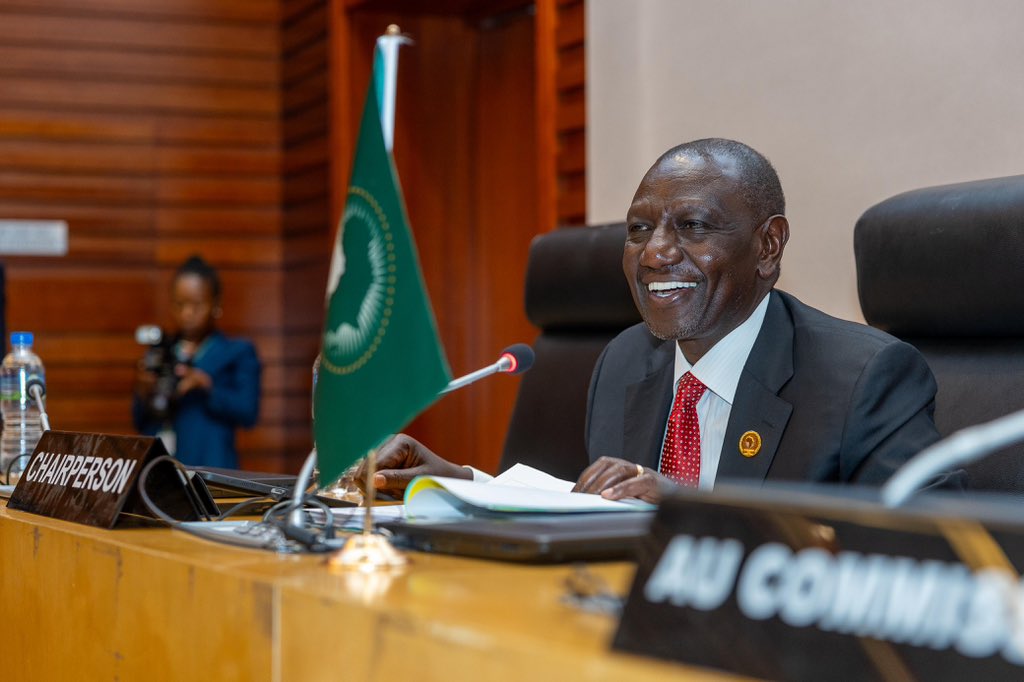
 President William Ruto during a meeting at the African Union Assembly in Addis Ababa, Ethiopia on February 16, 2025/ PCS
President William Ruto during a meeting at the African Union Assembly in Addis Ababa, Ethiopia on February 16, 2025/ PCS
President William Ruto has proposed a raft of reforms to the African Union’s peace and security architecture to strengthen the union’s capacity to respond swiftly and effectively to emerging crises.
Ruto called for a revamped approach to tackle the continent's escalating conflicts and security challenges in a more timely manner.
"The security landscape in Africa is changing rapidly, and our mechanisms must evolve accordingly. We can no longer afford to be reactive,” he said.
“Africa needs a robust, agile, and unified response to the threats facing us.”
The President was speaking on Sunday to the AU Assembly on the sidelines of the Ordinary Assembly in Addis Ababa, Ethiopia.
He recommended a comprehensive review of the AU's current peace and security mechanisms including appointing a panel of five eminent African experts to evaluate the effectiveness of the existing security structures.
The goal, Ruto emphasised, is to ensure that AU’s peace and security framework is equipped to confront new and emerging security threats, including terrorism and regional conflicts, with greater efficiency.
"Africa’s peace and security framework must be more than just a theoretical structure. It needs to be action-oriented and capable of addressing contemporary security challenges such as terrorism and instability that threaten our societies," Ruto explained.
“We need to strengthen our collective capacity to respond swiftly to these challenges.”
The reform agenda also includes a proposal to review the relationship between the AU and regional economic communities (RECs), ensuring that their roles in peace and security efforts are more clearly defined.
Ruto called for a more streamlined and effective division of labour between the AU, RECs and member states, with the aim of avoiding overlaps and inefficiencies in conflict response.
The President highlighted the importance of strengthening the African Standby Force, a key component of the AU's peace and security efforts.
He called for greater commitment from member states to ensure the force is adequately funded, equipped and ready to deploy in response to crises.
“We must ensure that the African Standby Force is not just a symbolic entity but a fully operational tool that can respond to crises at short notice,” Ruto said.
“To achieve this, member states must honour their commitments to the force’s funding and operational readiness.”
Additionally, the President proposed a series of financial reforms aimed at securing long-term sustainability for the AU’s peace and security initiatives.
Ruto urged the AU to move closer to its goal of financing 100 per cent of its operational budget and a significant portion of its peace support operations through member state contributions.
He called on the AU Executive Council to convene an extraordinary session with finance ministers to develop a roadmap for achieving these goals within five years.
The President also touched on Kenya's active role in the search for peace in Haiti where her troops are leading the Mutinational Security Support Mission (MSS).
Ruto proposed the adoption of a Draft Declaration on AU Solidarity with Haiti at the AU Assembly, to affirm its status as part of Africa’s Sixth Region and ensuring sustained support for the mission, including advocating for a transition of the MSS into a UN Peacekeeping Operation.
The President also called for a transformation of the African Court of Justice, which has been stalled for years due to disagreements over its merger with the African Court on Human and Peoples’ Rights.
He urged the AU Assembly to finalise the court’s operational requirements and ensure it becomes a fully functioning part of the continent’s legal and governance framework.
Ruto addressed the Pan-African Parliament (PAP), urging greater political support for the Malabo Protocol, which would grant the PAP legislative authority.
Currently, only 15 member states have ratified the protocol, limiting the Parliament’s influence.
Ruto emphasised that for the AU to be truly effective, its institutions must work in synergy, with the PAP playing an active legislative role in decision-making.
“We cannot continue to ignore the role of the Pan-African Parliament in our governance structure. It is time to empower it with legislative authority,” Ruto said.
"This will ensure a more comprehensive and democratic approach to addressing conflicts on the continent."



![[PHOTOS] Ruto at Pope Francis' burial](/_next/image?url=https%3A%2F%2Fcdn.radioafrica.digital%2Fimage%2F2025%2F04%2F844cb891-abd4-4ee5-bc2d-2a0c21fa3983.jpeg&w=3840&q=100)





